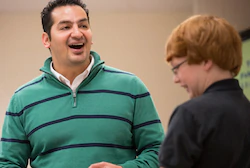Published 2018
Wise Guys

"I was thinking about having sex, but Wise Guys helped me see that it’s okay to wait until I’m ready."
- Wise Guys Participant
Program Description
Wise Guys is a male responsibility health education curriculum. The program helps young men redefine what manhood means to them and supports them in making positive sexual health decisions.
Currently, the teen pregnancy prevention evidence base does not include any programs developed specifically for adolescent males. Wise Guys is undergoing a process evaluation and shows promise as a program for young men.
- Population: Male students in grades 9 through 12
- Locations: Two school districts in Iredell County, NC
- Partners: Local school districts, Abt Associates
Goals
- Prevent teen pregnancy, sexually transmitted infections (STIs), and dating violence
- Promote healthy concepts of masculinity, manhood, and fatherhood
- Encourage young men to respect themselves and others
- Help young men understand the importance of male responsibility, particularly in intimate relationships
- Help young men improve communication with parents and guardians about sexuality and relationships
Strategies
Sex education tailored to young men
The Wise Guys curriculum helps young males take a close look at how masculinity affects their sexual health decisions. Beyond teaching basics, such as reproductive anatomy and prevention of pregnancy and STIs (including HIV), Wise Guys helps students learn more about themselves, identify their long-range personal and career goals, and develop practical steps to make those goals a reality.
Wise Guys is delivered through weekly 45-minute lessons during a free period at school, for 10 to 12 weeks. Young men participate in a variety of activities, including games and quizzes, role-plays, small-group projects, and brainstorming. One popular activity is the “man box,” in which participants discuss society’s unwritten rules for men, how those expectations influence their behavior, and what their ideal version of masculinity is. The program is facilitated by a Children’s Home Society health educator and supported by a school site coordinator.
Stats at a Glance
- 22.2 Iredell County teen birth rate (per 1,000 females ages 15-19) in 20161
- 20.3 national teen birth rate (per 1,000 females ages 15-19) in 20162
- 471 Iredell County Wise Guys participants (2016-18)
- 4,400 Wise Guys participants across North Carolina (2016-2017)
- 86% North Carolina participants who increased or maintained good communication with parents about sex and relationships (2016-2017)
- 82% North Carolina participants who increased or maintained their knowledge of anatomy and physiology (2016-2017)
In Focus: Daniel’s Story

Daniel* earned a tough-guy reputation—first as a carjacker, then a gang member, drug dealer, and unintentional father. Landing in the hospital after being shot was a wake-up call. At age 20, Daniel returned to high school and joined Wise Guys, where he served as a role model for younger students. Supported by his participation in Wise Guys, Daniel graduated and enrolled at Lincoln College of Technology, where he plans to study heavy machinery and diesel engine maintenance.
* Name has been changed to ensure the privacy of the participant.
Grantee Information
Rick Brown
Youth Education Program Director
(336) 553-9706
rbrown@chsnc.org
www.chsnc.org/
Print the full success story here.
About the TPP Program
The Office of Population Affairs (OPA) Teen Pregnancy Prevention (TPP) program is a federal grant program that funds diverse organizations working to prevent teen pregnancy across the United States. OPA invests in both the implementation of evidence-based programs and the development and evaluation of new and innovative approaches to prevent teen pregnancy. The OPA TPP program reaches adolescents ages 10-19, with a focus on populations with the greatest need in order to reduce disparities in teen pregnancy and birth rates.
Footnotes
1 North Carolina State Center for Health Statistics. (2017). 2016 NC resident fertility rates: Females ages 15-19 by race/ethnicity, perinatal care regions, and county of residence. https://schs.dph.ncdhhs.gov/data/vital/pregnancies/2016/fert1519.pdf. back to top
2 Martin, J.A., Hamilton, B.E., Osterman, M.J., Driscoll, A.K., & Drake, P. (2018). Births: Final data for 2016. National Vital Statistics Report, 67(1). Hyattsville, MD: National Center for Health Statistics. https://cdc.gov/nchs/data/nvsr/nvsr67/nvsr67_01.pdf. back to top
 An official website of the United States government
An official website of the United States government
